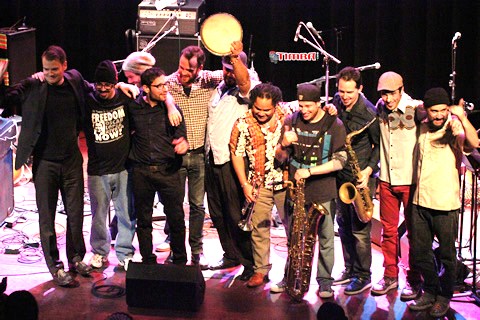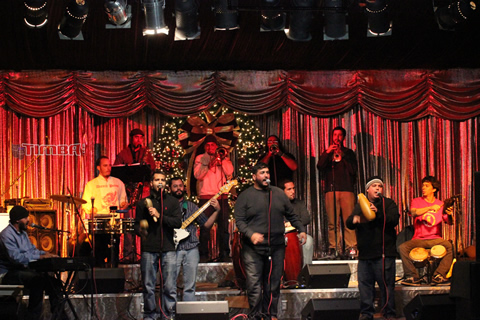Archivo
New Stuff[hide]
Musicos: Rafael Paseiro Monzón
Musicos: Dennis Nicles Cobas
Musicos: Jiovanni Cofiño Sánchez
Musicos: Yasser Morejón Pino
Fotos: Tom Ehrlich : 2024 Monterey Jazz, P...
Resenas: Vacilón Santiaguero (Circle 9 ...
Staff: Bill Tilford
Fotos: Tom Ehrlich : 2024 Monterey Jazz, P...
Fotos: Tom Ehrlich : 2024 Monterey Jazz Fe...
Fotos: Tom Ehrlich : testing 123
Grupos: Pupy y los que S... : Discography - 1995- F...
Reportes: From The St... : Cubadisco 2...
Reportes: From The St... : Jazz Plaza ...
Fotos: Tom Ehrlich : Irakere 50th Annivers...
Photos of the Day [hide]
Sin Clave No Hay Na
A New Musical Hope For Chicago:
The 2nd Annual Afro-Caribbean Improvised Music Festival
Article by Bill Tilford
Photos by Bill Tilford (plus a Special Photo Gallery by Joshua Bennett)
All Rights Reserved
Pupy Cantor and the Edwin Sanchez Orchestra at the Old Town School of Folk Music
In the late 1990s, and for a brief period in more recent years, Chicagoans had the luxury of seeing some bands from Cuba and Puerto Rico at prices ranging from free to a minimal admission charge at various city festivals and events. While it was wonderful to experience these performances while they were happening, as a long-term proposition, they may have conditioned audiences to expect to see this music at little or no visible cost (these performances were never truly "free" since payment came from a city budget that was experiencing escalating problems over the years). More recently, the city has dramatically reduced its financial support for several musical events, cancelling some and dramatically reducing the scope of others. Among other things, the Viva Chicago festival is no more, and the annual Puerto Rican festival in Humboldt Park has been shortened to adapt to budget cutbacks. The best information available to us indicates that this funding is unlikely to come flowing back in the foreseeable future, and increasing private (both for-profit and not-for-profit) sources will be needed to pick up the slack if Chicagoans hope to see this type of music live.

Henry Cole and the Afrobeat Collective at the Mayne Stage .
Fortunately, two private venues have already stepped in to do what they can - the Mayne Stage and the Old Town School of Folk Music have been very aggressive in booking touring bands (including bands from Cuba) and have done a commendable job with the resources available to them. The Old Town School in particular has used its outdoor festival as well as its indoor venues to help give the music a home. More recently, a new privately-organized festival, Festival Cubano , has also emerged as a noteworthy annual event (it is doubtful that this particular event will be in a position to book talent from outside the US, at least in the near future, but it has shown positive growth during its first three years in its ability to book a wide range of acts from within the United States).
One challenge confronting festivals and large concerts generally is that the corporate sponsorship model, an important source of large-scale financing, has changed in some ways from years past. For example, once upon a time, it was common for alcohol and tobacco companies to pump significant financial support into these types of events, but there was an outcry from some quarters of the community about these entities being undesirable as sponsors, and that funding source has significantly diminished (or disappeared entirely in some cases) without being easily replaced. As an unintended side effect of other federal legislation beyond the scope of this article, many other types of corporations now have increasingly bureaucratic processes to evaluate their possible support for festivals, concerts and cultural events. To make a long story short, it isn't as easy to get money as it was once upon a time, and this means that audiences will be asked to participate more in the costs of events in the future.

Orquesta El Macabeo at the Willowbrook Ballroom
As a consequence of this increasingly-difficult environment, private initiatives will become even more important over time, and we are glad to see new festivals come on line if they are organized realistically and show genuine promise. A relatively new festival, the 2nd Annual Afro-Caribbean Improvised Music Festival, shows that promise.
The 2nd Annual Afro-Caribbean Improvised Music Festival was organized by Agúzate and the Segundo Ruiz Belvis Cultural Center in Chicago with significant support from the Old Town School of Folk Music (which also hosted the first night's event), Sound Culture and the Mayne Stage (which hosted the second night's event), the Lázaro Law Group , which helped underwrite the second night's event, Latin Street Dancing's Salsa and Bachata Fridays and the Bottom Lounge , which hosted and supported Orquesta El Macabeo's Friday night concert, and the Willowbrook Ballroom , which hosted the final nights event. One of things that we particularly like about this new festival is that one of the key organizers, Omar Torres-Kortright , has demonstrated a keen eye for underexposed but innovative talent - two of this year's entries, Orquesta El Macabeo and Henry Cole and the Afrobeat Collective , probably would not have found their way to Chicago without his efforts, and both are creative powerhouses deserving more exposure than they have received to date. Since this festival took place over the course of a few evenings, we have published separate reviews and photo galleries for the different performances:
1. For the review and galleries of the tribute to Chamaco Ramírez by Pupy Cantor and the Edwin Sanchez Orchestra at the Old Town School of Folk Music (opening night), click here .
2. For Henry Cole and The Afrobeat Collective at the Mayne Stage (second night), click here .
3. For the Orquesta El Macabeo shows at the Bottom Lounge and the Willowbrook Ballroom, (third night and final night), click here .
4. For Joshua Bennett's special Orquesta El Macabeo Gallery, click here .
Two of the vendors at the record fair
In addition to the concert series, one night was devoted to a small but very nice record fair plus a traveling parranda which took party buses with live musicians to several restaurants. We missed the parranda but did pick up some nice vinyl at the record fair.
The 2nd Annual Afro-Caribbean Improvised Music Festival was an artistic success, and we hope that this Festival grows and thrives as a vehicle to do what it does best - find music that isn't getting the exposure that it deserves and present it in venues that treat the music and musicians properly. Although this year's lineup did not happen to include any Cuban and/or Cuban American music acts, a few groups were considered, we are optimistic that some of the best will find their way into the schedule in future years as the festival matures and hopefully becomes a new cultural fixture in Chicago. However, we have absolutely no complaints about the the talent that appeared this year - as you'll read from the reviews, these were all excellent selections.



















